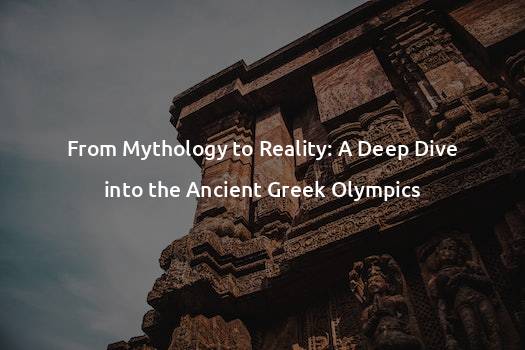From Mythology to Reality: A Deep Dive into the Ancient Greek Olympics
From Mythology to Reality: A Deep Dive into the Ancient Greek Olympics
In the realm of ancient Greece, where myth and reality intertwined, the Olympic Games were born. These legendary athletic competitions, held every four years in honor of the Greek god Zeus, were more than just physical contests – they represented the pinnacle of human achievement and a place where heroes were made. Let’s embark on a journey through time and explore the origins, rituals, and significance of the Ancient Greek Olympics.
The Mythological Origins
Legend has it that the Olympics originated in the mythological realm. According to the ancient Greek poet Homer, the idea for the Games came from Zeus himself. In the city of Olympia, Zeus instituted a tradition to commemorate his victory over the Titans. It is said that Hercules, the greatest hero of Greek mythology, was the first to compete in these games as a tribute to Zeus.
Over time, the mythological roots of the Olympics transformed into a reality. Historians suggest that the first recorded Olympic Games took place in 776 BCE, marking the beginning of a grand tradition that would endure for over a millennium.
The Rituals and Structure
The Olympics were much more than mere athletic competitions; they were infused with religious rituals and ceremonies. The Games were held in honor of Zeus, the king of the gods. Participants and spectators alike believed that the divine was present at these events.
The opening ceremony, known as the “agon,” showcased solemn rituals and sacrifices to appease the gods. Athletes and officials gathered at the Temple of Zeus, where a grand procession marked the beginning of the Games. A sacred flame, brought from Mount Olympus, was lit to symbolize the presence of the gods during the competitions.
The structure of the Games was simple yet robust. The Olympics comprised various sporting events, including foot races, wrestling, boxing, javelin throw, and chariot racing. The competitors, all male participants from Greek city-states, trained rigorously for years leading up to the Games. Victory in the Olympics brought immense prestige and honor to both the athletes and their respective cities.
The Significance
The Ancient Greek Olympics held profound significance in the hearts and minds of the people. Beyond the athletic prowess and admiration for the competitors, the Games were viewed as the embodiment of ancient Greek values.
Physical excellence was highly prized in Greek society, and the Olympics provided a platform to showcase the peak of human abilities. Moreover, the Games served as a way to foster peace and unity among the often-warring city-states. A temporary truce was declared during the Games, allowing athletes, officials, and spectators to travel to Olympia without fear of conflict.
The Olympics also had immense cultural and artistic importance. Poets, musicians, and philosophers flocked to the Games, turning Olympia into a vibrant hub of intellectual exchange. It was an opportunity to celebrate not only physical achievements but also artistic and intellectual expressions.
TLDR;
The Ancient Greek Olympics, rooted in mythology, emerged as a celebrated tradition in 776 BCE. These Games, held in honor of Zeus, combined religious rituals and athletics. The Olympics showcased the pinnacle of human abilities, fostered peace among city-states, and provided a hub for cultural and artistic exchange. Beyond the physical contests, the Games symbolized the core values and aspirations of ancient Greek society.







